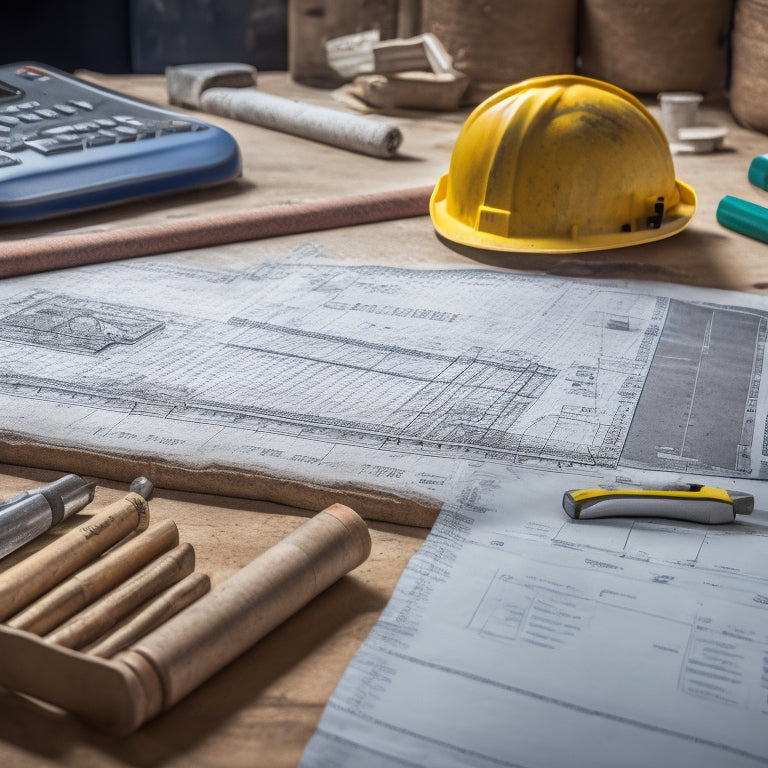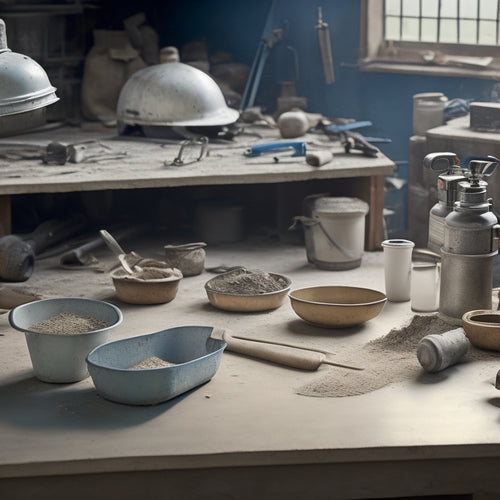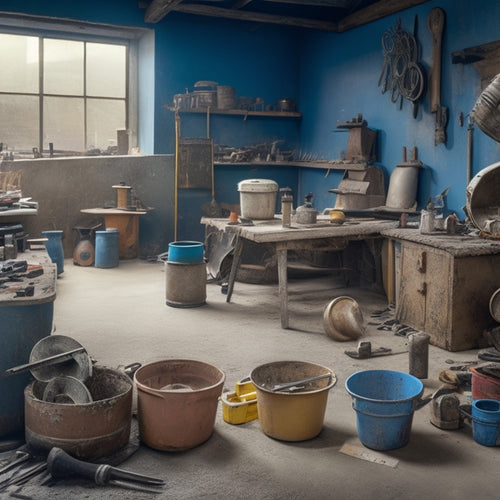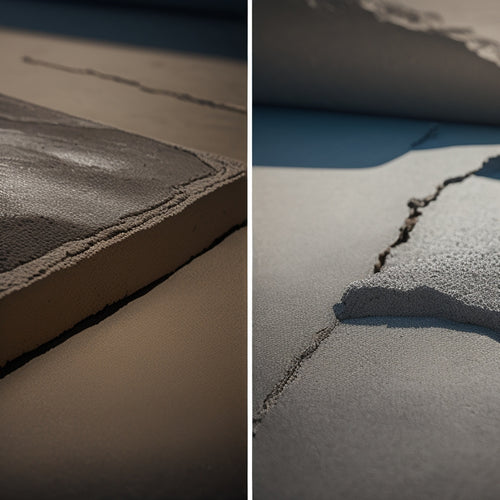
5 Tips for Accurate Concrete Measurement Tools
Share
To guarantee accurate concrete measurement, you'll want to calibrate your measuring tools regularly, choosing a frequency that suits your project's needs. Select a measuring unit that your team is aligned on, and measure ingredients precisely using digital tools or scales. Avoid common errors by establishing standardized measurement techniques and investing in digital tools that reduce human error. By following these practices, you'll prevent significant miscalculations that can compromise your concrete's quality and structural integrity. Now, get ready to explore more strategies for achieving precise concrete measurements that meet the highest standards of quality and reliability.
Key Takeaways
• Establish a regular calibration frequency for measuring tools to ensure accuracy and precision in concrete measurement.
• Choose the right measuring unit (metric or imperial) and ensure team alignment to avoid conversion errors and ensure consistency.
• Measure ingredients accurately by following specific ratios, using correct units, and converting accurately when needed to ensure reliable concrete mixing.
• Avoid common measurement errors by establishing standardized techniques, calibrating tools regularly, and identifying potential error sources.
• Invest in digital measuring tools like digital calipers and laser distance meters to enhance accuracy, efficiency, and reduce human error.
Calibrate Your Measuring Tools
Make certain your measuring tools are accurate by calibrating them regularly, as even a slight deviation can greatly impact the quality of your concrete construction project.
Regular calibration guarantees that your measurements are precise, which is vital in achieving the desired strength and durability of the concrete structure. It's important to establish a calibration frequency that suits your project's requirements. For instance, you may need to calibrate your tools daily, weekly, or monthly, depending on the usage and environmental conditions.
In addition to calibration, you should also prioritize tool maintenance. Clean and store your measuring tools properly to prevent damage and guarantee their longevity.
Regularly inspect your tools for signs of wear and tear, and replace them if necessary. A well-maintained tool is more likely to provide accurate measurements, which is critical in concrete construction.
Choose the Right Measuring Unit
When working with concrete, selecting the correct measuring unit is essential, as it directly impacts the accuracy of your calculations and ultimately, the structural integrity of your project. You must choose a unit that aligns with your application's requirements and guarantees consistency throughout the project.
Here are three key considerations to keep in mind when selecting a measuring unit:
-
Metric or Imperial System: Decide whether to use the metric system (e.g., liters, kilograms) or the imperial system (e.g., gallons, pounds). Confirm that all team members are on the same page to avoid measurement conversions and errors.
-
Application Relevance: Choose a unit that's relevant to your application. For example, if you're working with small quantities, milliliters or ounces might be more suitable than liters or gallons.
-
Standardization Practices: Establish standardization practices within your team to secure consistency in unit selection. This will help prevent errors and guarantee that all calculations are accurate and reliable.
Measure Ingredients Accurately Every Time
To guarantee accurate concrete mixing, you must precisely measure ingredients according to your chosen unit of measurement, taking into account the specific requirements of your project. This means carefully calibrating your measurement tools and making certain that you're using the correct measurement techniques for each ingredient.
Remember, even slight variations in ingredient ratios can greatly impact the final product's strength, durability, and appearance.
When measuring ingredients, it's crucial to follow a consistent and systematic approach. Start by identifying the specific ingredient ratios required for your project, and then use these ratios to guide your measurement process.
Make sure you're using the correct measurement units (e.g., pounds, kilograms, or liters) and that you're accurately converting between units when necessary.
To guarantee precision, consider using digital measurement tools or scales that can provide accurate readings to within a few decimal points. Additionally, regularly clean and maintain your measurement tools to prevent errors caused by worn or damaged equipment.
Avoid Common Measurement Errors
By recognizing and addressing common pitfalls, you can circumvent measurement errors that can compromise the integrity of your concrete mixture.
To guarantee accurate measurements, it's crucial to identify potential sources of error and take corrective action.
Here are three common measurement errors to watch out for:
-
Inconsistent measurement techniques: Using different measurement techniques for different ingredients or batches can lead to inconsistent results. Establish a standardized measurement protocol to guarantee accuracy and consistency.
-
Improperly calibrated tools: Failing to calibrate your measurement tools regularly can result in inaccurate readings. Regularly calibrate your tools to guarantee they provide accurate measurements.
-
Rounding errors: Rounding measurements to the nearest whole number can lead to significant errors. Use precise measurement techniques and avoid rounding to guarantee accurate calculations.
Invest in Digital Measuring Tools
You can markedly upgrade your measurement accuracy and efficiency by shifting to digital measuring tools, which offer precise readings and streamlined operations. This move won't only reduce errors but also save you time and effort.
Digital calipers, for instance, provide accurate measurements with a high degree of precision, eliminating the need for manual calculations. They're also more durable and resistant to wear and tear, guaranteeing consistent results even in harsh environments.
Laser distance meters are another game-changer, allowing you to measure distances quickly and accurately without the need for manual calculations or physical contact. This eliminates the risk of human error and reduces the time spent on measurements.
With digital measuring tools, you can focus on other critical aspects of your concrete project, knowing that your measurements are accurate and reliable. By investing in these tools, you'll not only improve your workflow but also guarantee the safety of your team and the integrity of your structure.
Make the switch to digital measuring tools today and experience the difference for yourself.
Frequently Asked Questions
Can I Use Measuring Cups for Both Dry and Liquid Ingredients?
When working with concrete, you'll need to guarantee accurate measurements.
Can you use measuring cups for both dry and liquid ingredients? It's not recommended.
Measuring cups aren't designed for precise ingredient conversions, and using them for both can lead to contamination and errors.
Instead, use separate, dedicated cups for dry and liquid ingredients to maintain accuracy and prevent mistakes that can compromise the integrity of your concrete mixture.
How Do I Handle Measuring Ingredients in Extreme Temperatures?
When measuring ingredients in extreme temperatures, you'll need to take extra precautions to guarantee accuracy.
Temperature effects can alter ingredient consistency, leading to inaccurate measurements. In hot environments, ingredients may expand or become more fluid, while cold temperatures can cause them to contract or become more viscous.
You should adjust your measurement techniques accordingly, using calibrated tools and allowing ingredients to reach room temperature before measuring to minimize these effects.
What Is the Best Way to Measure Ingredients With Irregular Shapes?
You've likely wondered if irregularly shaped ingredients can be accurately measured. The truth is, it's a challenge many professionals face.
When dealing with irregular shapes, you need to employ specialized measurement techniques. One approach is to use a volumetric measurement method, where you calculate the volume of the ingredient by measuring its displacement in a fluid.
This technique guarantees accurate measurements, even with unusual shapes, and helps you achieve consistent results in your concrete mix.
Can I Reuse Old or Worn-Out Measuring Tools?
When reusing old or worn-out measuring tools, you're compromising measurement accuracy.
It's essential to prioritize tool maintenance to guarantee reliable results. Worn-out tools can lead to inconsistent measurements, putting your project's safety and quality at risk.
Regularly inspect and calibrate your tools to prevent errors. If a tool is damaged or shows signs of wear, replace it to maintain precision and ensure accurate measurements.
Are There Any Specific Measuring Tools for Different Types of Concrete?
When building a high-rise, you wouldn't use a ruler to measure the floor plan, right?
Similarly, when working with concrete, you need specific tools for different types. You'll require a density gauge for high-density concrete, and a laser level for precise volume calculations.
Don't risk inaccurate measurements; use the right tool for the job to guarantee safety and structural integrity.
For instance, a concrete corer is a must-have for measuring the compressive strength of concrete.
Conclusion
You've made it through the concrete measurement gauntlet! Pat yourself on the back, but not too hard, or you'll knock over that precision-crafted concrete mix.
Seriously, though, following these 5 tips will guarantee your concrete measurements are spot-on.
Now, go forth and pour some perfect slabs – the construction world is counting on you.
Remember, in the immortal words of the concrete gods: 'Measure twice, pour once, and don't make us come over there to redo it.'
Related Posts
-

What Tools Do You Need for Concrete Success
For concrete success, you'll need a range of essential power tools, including rotary hammers, angle grinders, concret...
-

Best Tools for Concrete Restoration and Repair
When tackling concrete restoration and repair projects, you need a range of reliable tools to achieve professional-gr...
-

What Tools Ensure Strong Concrete Adhesion at Home
You'll need the right tools to guarantee strong concrete adhesion at home. For surface preparation, use concrete surf...


